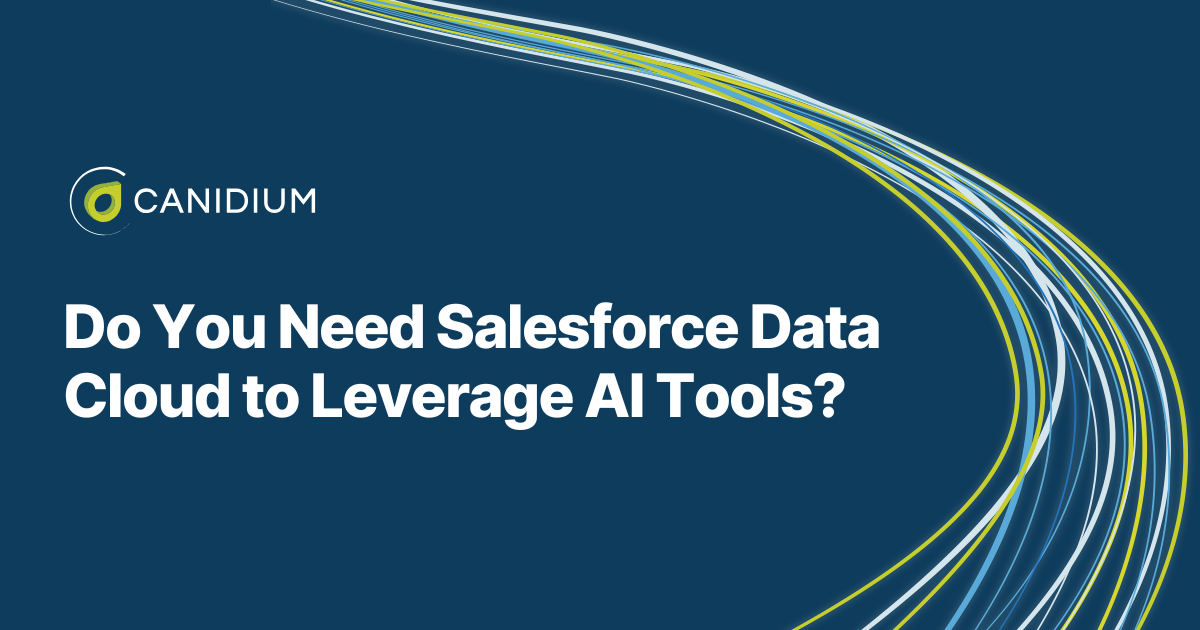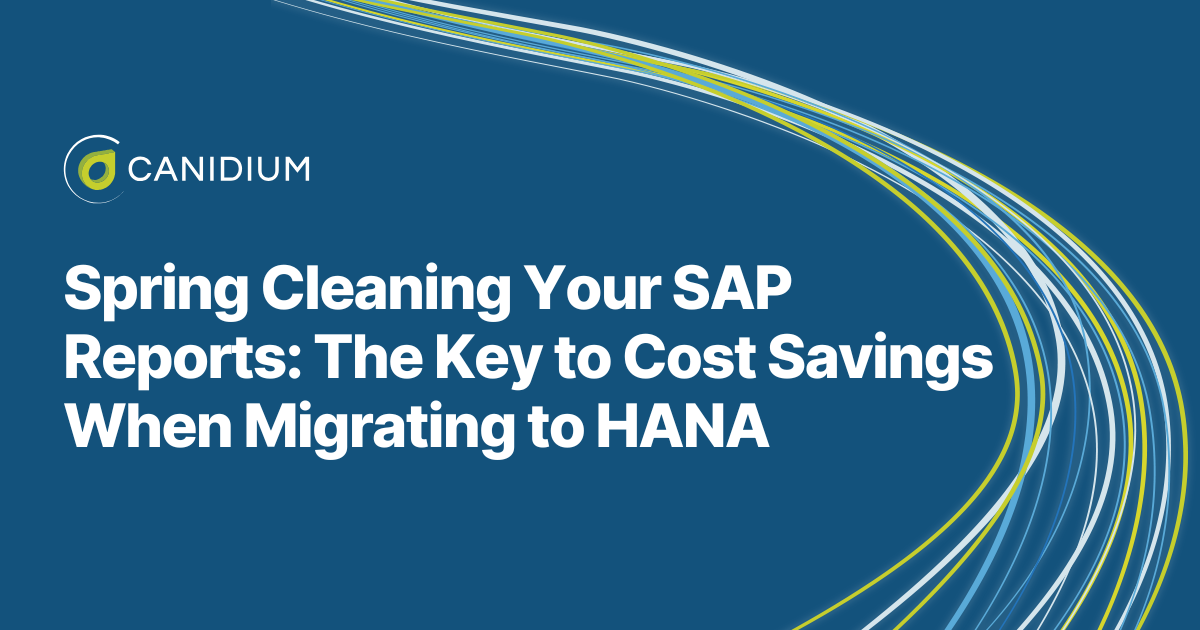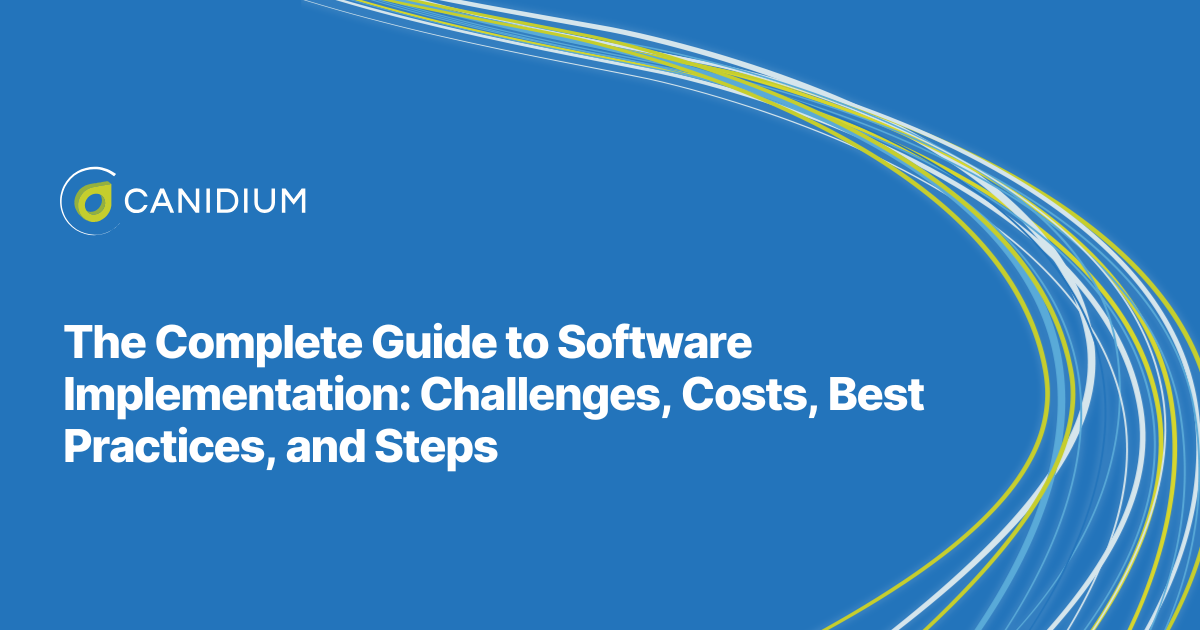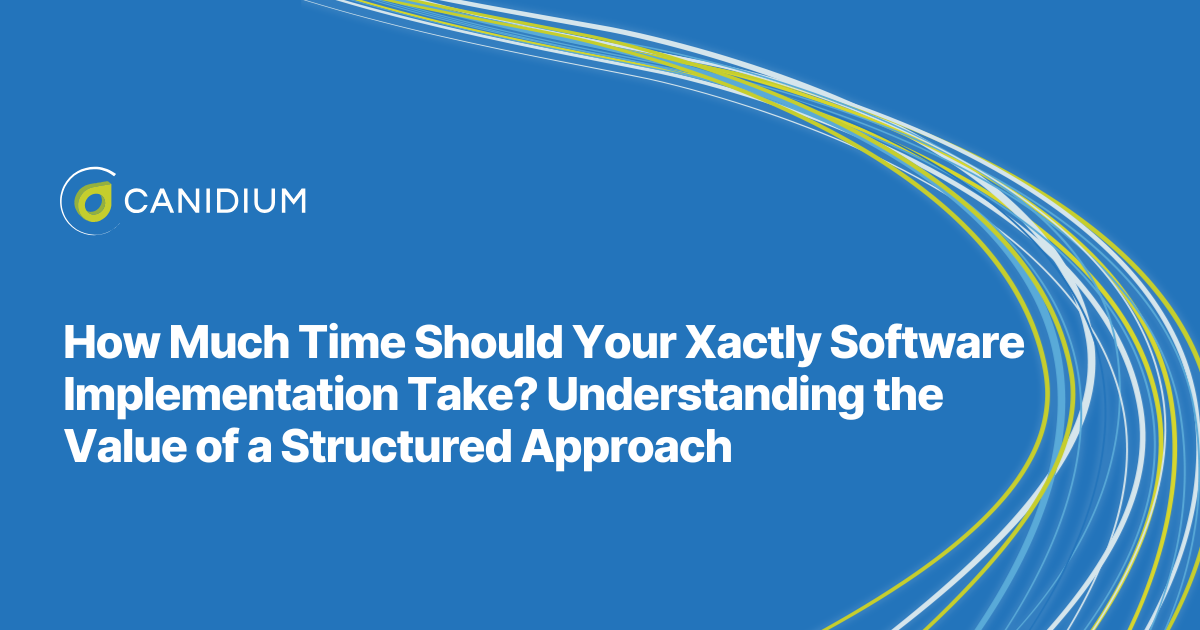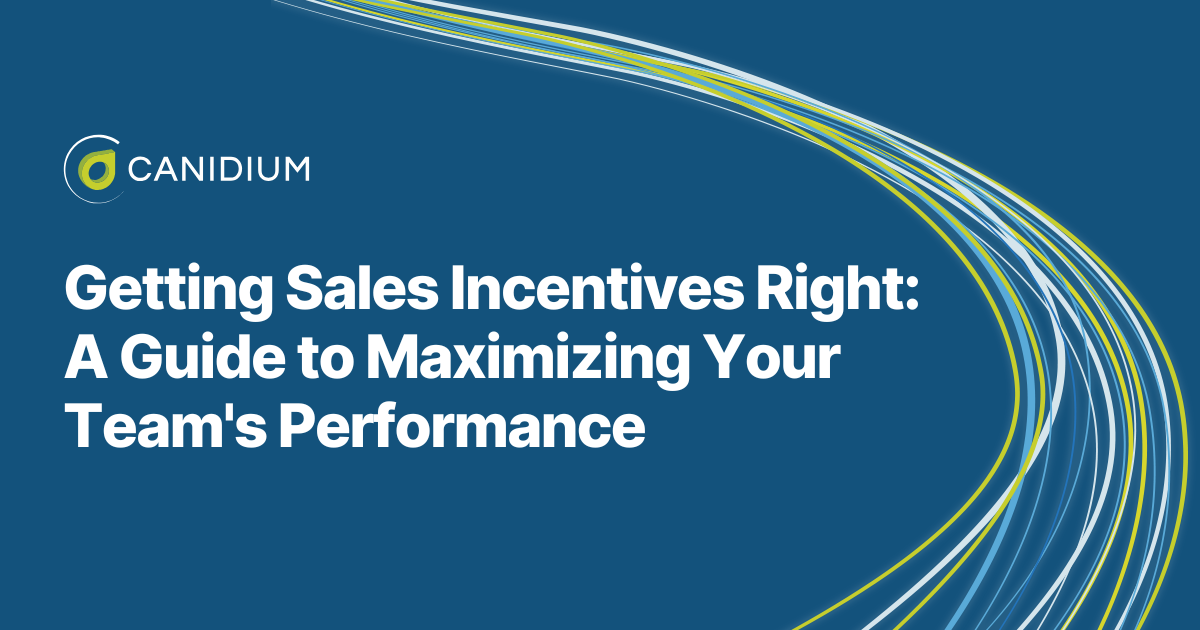While 85% of organizations view data as one of their most valuable assets, mismanagement of this resource is all too common. In fact, a reported 40% of business-critical data is trapped in data silos. As AI becomes more central across industries, insufficient data infrastructure is growing in consequence, increasingly driving negative business outcomes. Now more than ever, shoring up your data integrations between software solutions is vital.
At Canidium, our software implementation experts design, configure, and install best-in-class partner platforms—ensuring that clients' new solutions are seamlessly embedded into existing infrastructure. Our team of Salesforce specialists ensures data accuracy and integrations are comprehensive, eliminating data silos that curtail the potential of AI products.
This article covers the following topics to help you determine if Salesforce Data Cloud is the right data integration solution for your unique business needs and goals:
- What is Salesforce Data Cloud?
- What Are Salesforce Einstein AI Products?
- Do You Need Salesforce Data Cloud to Use AI Products?
- The Benefits of Salesforce Data Cloud
- Is Salesforce Data Cloud Worth the Cost?
What is Salesforce Data Cloud?
Salesforce Data Cloud is a library of connectors. It centralizes and integrates data from various software solutions within a company's infrastructure into unified customer profiles. As a result, businesses can combine data from CRM systems, marketing platforms, customer service databases, and third-party applications—thus eliminating data silos.
Considering that knowledge workers report spending almost 12 hours a week chasing siloed data, the potential overhead cost reductions of improved data integration are expansive. Although, Salesforce Data Cloud also offers benefits beyond this foundational infrastructure adjustment.
One key aspect of Salesforce Data Cloud's functionality is its ability to provide a real-time, comprehensive view of customer interactions, transactions, and behaviors across different departments. This enhances the capability for personalized customer engagement, predictive models, and effective data analysis for sales and marketing teams.
Beyond facilitating the seamless integration of diverse data sources, Salesforce Data Cloud also automates certain marketing actions based on customer behavior, sales trend predictions, and proactive customer service measures. For example, a marketer can integrate data from Salesforce Marketing Cloud and HubSpot, enabling them to craft personalized marketing campaigns informed by a detailed understanding of each customer's journey. Overall, Salesforce Data Cloud enhances AI products capabilities by connecting them to more comprehensive and accurate information.
What Are Salesforce Einstein AI Products?
Salesforce Einstein AI encompasses a comprehensive suite of over 60 AI-driven products integrated across various Salesforce applications. Designed to simplify and enhance the increasingly complex databases and customer interactions, Einstein AI tools serve a wide variety of functions, encompassing automation, analytics, and improved customer journeys with personalization.
More specifically, Salesforce's AI tools serve functional areas, including sales, service, marketing, analytics, commerce, and the broader Salesforce Lightning platform. For sales, products like Einstein Lead Scoring and Einstein Opportunity Scoring help prioritize leads and opportunities by scoring them based on their likelihood of conversion, leveraging historical conversion patterns.
Similarly, in customer service, Einstein Bots and Einstein Case Classification automate responses and categorize customer queries for more efficient resolution. Marketing benefits from features like Einstein Engagement Scoring and Einstein Content Selection, which optimize customer engagement through data-driven insights. Each product within the Einstein suite enhances specific aspects of user interaction and backend analytics, making Salesforce not only a CRM tool but also a powerful engine for predictive insights and personalized customer experiences.
Do You Need Salesforce Data Cloud to Use AI Products?
There's no simple yes or no answer to this question. In short, it depends. When considering whether Data Cloud is necessary for leveraging Salesforce AI tools, the answer varies based on the specific application or product you intend to use.
The necessity of Data Cloud depends significantly on the complexity and needs of the specific AI application. While basic functionalities might not require it, advanced uses that rely on deep data insights and integrations will benefit immensely from the unified data environment that Data Cloud provides.
Basic Salesforce AI Products: Lead Scoring
Data Cloud is not mandatory for simpler Salesforce AI applications like Lead Scoring. These models can operate effectively using limited data sets directly associated with leads, such as demographic information, interaction history, and conversion likelihood. These models do not necessarily require the comprehensive data integration provided by Data Cloud.
These applications primarily utilize the data already present within a Salesforce instance, focusing on functions that can operate with localized datasets. Einstein Opportunity Scoring, for example, assesses opportunities based on the data directly related to sales activities and customer interactions recorded within Salesforce, providing actionable insights such as sales forecasts or potential high-value engagements without needing external data integration.
Advanced Salesforce AI Products: Salesforce Generative AI
In contrast, Data Cloud becomes a prerequisite for more complex data-intensive products like Salesforce Generative AI. Salesforce Generative AI requires a rich, unified data environment to generate accurate and contextually relevant insights and content. Data Cloud facilitates this by amalgamating disparate data sources into a cohesive database, providing the deep data access necessary for advanced AI computations.
These sophisticated tools require comprehensive data aggregation from multiple sources to function effectively. Data Cloud enables this by integrating disparate data systems into a unified customer profile. This integration is crucial for AI applications that depend on a holistic view of customer data to generate accurate and contextually relevant insights and actions.
AI Customer Service Agents: Salesforce Einstein AI
When building an AI 'Agent'—designed to assist employees or customers with tasks—Data Cloud is not strictly necessary for the initial setup. An AI Agent can be configured to perform specific tasks using data from isolated sources. However, to enhance the capability and effectiveness of the AI Agent, using Data Cloud is highly advantageous.
By aggregating all relevant data into a single source, Data Cloud allows the AI to comprehensively understand the context and nuances of each task it performs, dramatically improving its functionality and accuracy. At the same time, chat bots can offer more personalized customer experiences, potentially reducing abandoned cart rates. As a result, customer satisfaction with your AI agent services can also be greatly improved.
The Benefits of Salesforce Data Cloud
Rather than focusing on Salesforce Data Cloud requirements for AI products, a more pertinent question is whether you should leverage it regardless of whether or not it is required. Recognizing the significance of data volume and quality in building robust AI models is crucial. The more comprehensive and detailed the data available via Data Cloud, the more refined and accurate the AI's outputs will be. This not only leads to more effective solutions and strategies but also maximizes the return on investment in Salesforce AI technologies by ensuring that the AI operates at its highest potential.
The following benefits apply to Salesforce AI products regardless of whether or not Data Cloud is required for their use:

Unified Customer Profiles
The concept of a unified customer profile is foundational for sales and marketing. These profiles are only possible through the integration of various data stores into a single comprehensive customer map—enabling a more nuanced understanding of critical data such as purchase history cross referenced with customer behavior. Essentially, by consolidating data from multiple sources, such as sales interactions, customer service engagements, marketing responses, and social media activity, into a detailed and dynamic representation of each customer, marketing, and sales can personalize interactions.
As customer interactions occur across different platforms, whether through a purchase from an e-commerce site, a customer service call, or engagement with a marketing campaign, Data Cloud adds these to the customers' profiles in real-time, ensuring that individual information is always current and reflects the latest interactions and transactions. This cross-functional accessibility supports a more coordinated and customer-centric approach, enabling sales teams to see customer service histories, marketing teams to understand purchase behaviors, and customer service agents to access transaction records and previous interactions.
For example, imagine sales data is stored in both Salesforce Marketing Cloud and Hubspot platforms. By employing Salesforce Data Cloud, you can connect these two data stores, eliminating the gaps in your customer profiles. These profiles can then be utilized to tailor marketing campaigns with the aid of AI, enabling highly personalized and effective marketing strategies. For instance, the AI could analyze combined customer interaction data to determine the optimal time and content for marketing emails, enhancing engagement rates.
Improved Customer Experience
In disconnected systems, AI customer service agents may rely on limited or isolated data sources. For instance, chatbots may only be able to pull data directly connected to the specific task they are programmed to handle. This might include customer interaction histories, purchase records, or query types specific to the business segment the AI is serving. While this allows for a relatively quick and straightforward implementation, the AI's capabilities are constrained to the scope of the data it can access directly.
Integrating Data Cloud transforms the capabilities of AI customer service agents by providing them with access to a unified data platform. This integration offers several enhancements:
- Comprehensive Customer Profiles: Data Cloud compiles data from various sources across the company to create complete customer profiles. This comprehensive view includes historical interactions, preferences, transaction histories, and even sentiment analysis, which the AI can use to tailor its interactions more effectively.
- Contextual Understanding: With more complete data, AI agents can better understand the context of customer queries. For example, if a customer contacts about a problem with a recent order, the AI can immediately access the entire history of that order, past interactions, and related issues without requiring the customer to provide excessive background information.
- Improved Accuracy and Efficiency: AI agents can provide more accurate responses and solutions to customers by having a more detailed dataset. This capability significantly reduces the time customers spend interacting with the agent, leading to faster resolution of inquiries or problems, which enhances customer satisfaction.
- Personalized Interactions: Data Cloud enables AI agents to perform personalized interactions by leveraging the detailed data in customer profiles. This can range from using the customer's name and understanding their purchasing preferences to predicting future needs based on past behaviors. Personalization is key in elevating the customer experience, making interactions feel more engaging and responsive to the individual's needs.
- Proactive Service Opportunities: With a richer dataset, AI agents can identify potential issues before they become problems for the customer. For instance, if there is a recurring issue with a product that a customer frequently buys, the AI can proactively contact the customer to offer solutions or alternatives, thus preventing dissatisfaction and enhancing the customer's perception of the brand.
Powerful Marketing Platform Capabilities
An overwhelming 91% of surveyed customers report they are more likely to shop with brands that recognize, remember, and provide relevant offers and recommendations. Personalization is where Data Cloud truly shines in a marketing context. By leveraging the unified customer profiles, marketers can create highly targeted campaigns that speak directly to each customer's individual needs and interests. For instance, Data Cloud can help marketers tailor their communications to focus on products or upcoming promotions that are likely to be of interest to a customer based on their purchase history. This level of personalization not only increases the likelihood of conversion but also enhances the overall customer experience, making marketing feel more relevant and engaging.
Data Cloud also facilitates a high degree of automation in marketing processes. Marketers can streamline their operations and ensure timely and relevant communications by setting up automated workflows that trigger based on specific data points within the customer profiles. For example, if a customer abandons a shopping cart, Data Cloud can automatically trigger a reminder email or offer a discount to encourage completion of the purchase.
"Almost three-quarters (74%) of IT and engineering leaders say process automation has helped their workforce save at least 11-30% of the time previously spent on manual processes, and another 59% say costs on those teams have been reduced by 11-30%." - Salesforce.
To get a better sense of what these capabilities look like in action, imagine you are a marketer at an e-commerce company specializing in outdoor sports equipment. Using Data Cloud, you can access unified profiles that include each customer's purchase history, product preferences, and engagement with past marketing emails. The data reveals a segment of customers who purchase hiking gear in the spring each year. This insight lets you set up an automated campaign, sending personalized emails in early spring highlighting new hiking products, customer reviews, and special promotions.
The email campaign can be further personalized with recommendations based on each customer's previous purchases. For example, if a customer bought a tent last year, the email could feature new sleeping bags or hiking boots. This not only makes the marketing effort more relevant but also anticipates the customer's needs based on their purchasing history, enhancing the likelihood of repeat purchases.
Moreover, if the campaign detects that certain emails lead to higher engagement or conversion rates, these insights can be used to refine future campaigns, making them even more effective. Plus, the automated nature of these interactions ensures that the marketing efforts are efficient and scalable, allowing the marketer to manage multiple campaigns simultaneously without sacrificing the personal touch that customers value.
Additional Insights for Sales Reps
Centralized data access allows sales professionals to see comprehensive customer profiles that include all interactions, transactions, and engagements across various departments. With such detailed insights at their fingertips, sales reps can tailor their sales pitches and improve the chances of closing deals. Additionally, the real-time updates ensure that sales representatives have the most current information, enabling them to react promptly to customer inquiries and changes in customer behavior.
Moreover, Salesforce Data Cloud can automate and streamline many sales processes. For example, it can trigger alerts when a potential client reaches a critical point in the buying cycle or when there is an opportunity for upselling based on the customer's purchase history. This not only increases the efficiency of sales operations but also helps prioritize tasks and manage time more effectively. By reducing the time spent on manual data entry and analysis, sales teams can focus more on engaging with customers and building relationships.
Enhanced Salesforce Product Value
The notion that "more data equals better AI" is a fundamental principle in artificial intelligence. This concept is particularly crucial when investing in new AI models, as the volume and diversity of data directly influence the model's accuracy, effectiveness, and overall utility.
Why More Data Enhances AI Models
- Increased Accuracy: AI models, particularly those driven by machine learning algorithms, improve as they process more data. These models can better learn the nuances and variations within the information they analyze, leading to more accurate predictions and decisions. For instance, an AI model trained to predict customer preferences will perform more accurately if it can analyze a broader array of past customer behaviors across different demographics and purchase histories.
- Reduction of Bias: More comprehensive datasets reduce the risk of biases that can occur when AI models are trained on limited or skewed data. By incorporating a diverse range of data points, Data Cloud helps ensure that the AI's outputs represent the full spectrum of real-world scenarios, not just the subset that may be initially more visible or available.
- Enhanced Personalization: In customer-facing applications, the depth of data available can significantly enhance the personalization capabilities of AI systems. With more detailed customer profiles, AI can more effectively tailor experiences, recommendations, and services to individual needs.
- Complex Problem-Solving: Larger datasets enable AI models to handle more complex problems. With more varied data, an AI can recognize and adapt to complex patterns, making it suitable for advanced tasks like real-time decision-making.
Is Salesforce Data Cloud Worth the Cost?
The decision to implement Data Cloud should also consider factors like cost and data quality. Data Cloud can be a significant investment, making it more suited to larger or enterprise-level organizations that can fully leverage its capabilities. Smaller businesses or those just beginning to explore Salesforce AI might start with less complex applications that do not require such extensive data integration.
Moreover, the quality of the data fed into AI models is paramount. Poor data quality can lead to inaccurate AI predictions and inefficient strategies. Therefore, it is important to ensure your data is clean and well-managed before integrating it into more complex AI applications. This may involve initial data cleaning processes to remove inaccuracies and redundancies, in the form of a Technical Health Check (THC).
For organizations already deeply embedded in the Salesforce ecosystem, Data Cloud offers seamless integration with existing Salesforce applications. This integration is invaluable for connecting separate instances of Salesforce tools, such as combining sales and marketing data to foster more coherent and unified operational strategies.
Ultimately, Salesforce Data Cloud's ROI hinges on its capacity to centralize and optimize the use of data across an organization. Even for businesses that might not initially require its full range of capabilities, the strategic alignment of data sources it facilitates can lead to significant long-term benefits. These include enhanced decision-making, improved customer experiences, and the ability to quickly adapt to market changes by leveraging real-time insights.
As businesses grow and their data needs become more complex, the initial investment in Data Cloud can prove invaluable. It offers scalable solutions that support continuous improvement and operational efficiency. Thus, while the upfront costs might seem substantial, the potential for transformative impacts on business processes and customer engagement can justify the investment.
Determining if You Need Salesforce Data Cloud for Your AI Products
Salesforce Data Cloud is not universally necessary for all Salesforce AI applications but is indispensable for those requiring complex, integrated data environments. It enhances the functionality of AI tools by providing them with a rich, unified data source, which is critical for delivering precise and effective AI-driven outcomes. As such, Data Cloud is a strategic asset for companies aiming to maximize their use of Salesforce AI.
The decision to adopt Salesforce Data Cloud should consider costs, data quality, and organizational size, with larger enterprises likely to gain more due to their complex data needs. Ultimately, Salesforce Data Cloud is not mandatory for all AI applications, but it still significantly enhances the capabilities and effectiveness of Salesforce AI tools by ensuring they operate on a comprehensive and accurate data platform.
If you are interested in learning more about maximizing Salesforce's value at your organization, talk to one of our experts today.


